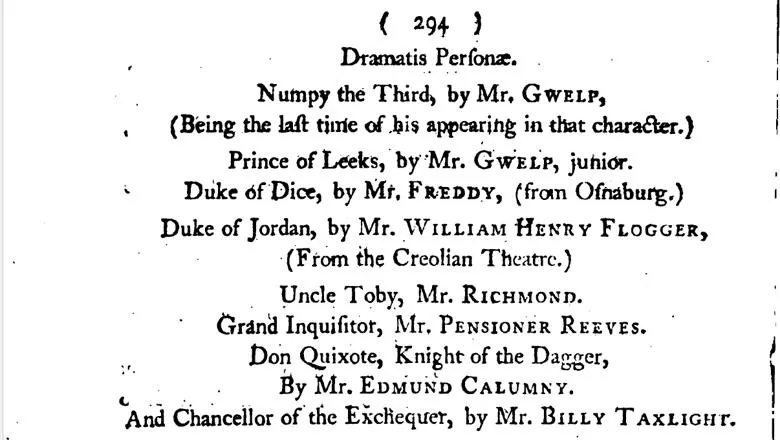09 July 2021
The Origins of the word ‘numpty' can be traced back 200 years earlier than previously thought
The origins of the word ‘numpty’, a popular term of mild abuse, have been traced back to 1794, backdating its current recorded appearance in the OED by almost 200 years.

In 2015, the OED put out a public appeal to see if anyone could provide an earlier origin for the etymology of the word ‘numpty’ than Michael Munro’s 1985 collection of Glaswegian dialect, The Complete Patter. As a result, its first usage was backdated by a year to Philip First’s novel, The great pervader.
Now, the AHRC-funded collaboration, ‘Radical Translations: The Transfer of Revolutionary Culture between Britain, France and Italy’ – a three-year, collaborative project by the Departments of French and Comparative Literature at King’s College London, which is led by Dr Sanja Perovic – has traced a much earlier usage of this term to a spoof playbill from 1794, antedating its current, recorded first appearance by almost 200 years.
This anonymous playbill appear to be a satirical advertisement for an imaginary farce called, “LA GUILLOTINE; Or GEORGE’S HEAD IN A BASKET!”, which was to be performed, “For the benefit of JOHN BULL, at the FEDERATION THEATRE, in EQUALITY SQUARE, on Thursday the 1st of April, 4971”, featuring as Dramatis personae, “Numpy the Third, by Mr. GWELP (Being the last time of his appearing in that character), Prince of Leeks by Mr. GWELP, junior etc.… The whole to conclude with A GRAND DECAPITATION OF PLACEMEN, PENSIONERS AND GERMAN LEECHES… Vive la Liberté! Vive la République!”.
The playbill was produced as evidence against Thomas Hardy during the 1794 Treason Trials. Hardy was the founder of the London Corresponding Society (LCS), a federation of local political clubs campaigning for the democratic reform of the British Parliament, and his trial, which lasted for nine days from 28 October to 5 November 1794, was the longest and most expensive trial for high treason heard in Britain to that date. This alleged evidence of regicidal intent, produced during the interrogation of a witness, appears to have been suppressed so effectively that no copies appear to have survived. Its contents are only known from the trial transcript published in 1795, and it is possible that it was fabricated by the government to strengthen its case (see notes 1/ and 3/).
While the first recorded usage of ‘Numpy’ actually dates back to a play from 1733, as a term of mocking endearment for a cuckolded husband, this is its first, recorded usage as a satirical nickname for a specified person. Derived from ‘numps’, a 16th-century term for someone characterized as silly or stupid, it appears to be referencing the king’s well-known mental condition. ‘Gwelp’ is a humorous variant on Guelph (or Welf), the original branch from which the House of Hanover dynasty was descended.
The later addition of a ‘t’ to make a more satisfying sound probably derived from the assonant slang phrase ‘Humpty Dumpty’, defined in Francis Grose's Classical Dictionary of the Vulgar Tongue (1785) as, "a short clumsy person of either sex; also ale boiled with brandy". The well-known rhyme appeared a few years later in the English composer Samuel Arnold’s 1797 collection of nursery rhymes set to music, Juvenile Amusements (see note 6/).
For a brief account of the ‘Radical Translations’ project, please see here https://www.kcl.ac.uk/news/department-of-french-and-department-of-comparative-literature-at-kings-college-london-awarded-1m-grant
For further information, please contact Sanja Perovic on sanja.perovic@kcl.ac.uk, or visit the website at https://radicaltranslations.org
Notes for editors:
1/ The spoof playbill was the only evidence of regicidal intent provided by the prosecution at Hardy’s trial during the interrogation of the witness John Edwards (a fellow LCS member). The fact that it doesn’t appear to have survived might suggest that it was devised and planted by a government informer, as proposed in court by Hardy’s defence counsel, Thomas Erskine.
2/ The playbill is also mentioned in the 1794 interrogation records of LCS members Jean-Baptiste Roussell (on 20th May) and John Baxter (on 8th July) – National Archives: PC 1/22/36 A).
3/ The Trial of Thomas Hardy for high treason, at the Sessions House in the Old Bailey… October [and] November, 1794… Taken in short-hand by Joseph Gurney, 4 vols (1795, Martha Gurney), ii:291-295. https://www.google.co.uk/books/edition/_/VHvBS2p0QuEC?hl=en&sa=X&ved=2ahUKEwjMobCD9dPxAhXPilwKHdseDJgQre8FegQIAxA-
4/ Hardy’s eventual acquittal by the jury was largely due to the appearance of an influential article by William Godwin, the novelist and political philosopher, in The Morning Chronicle on 21 October, a week before the trial. The success of this essay – republished as Cursory Strictures on the Charge delivered by Lord Justice Eyre to the Grand Jury, October 2, 1794 (1794, C & G Kearsley) – which demolished the spurious legal basis for equating the LCS’s demands for parliamentary reform with high treason, was such that one of the prosecution lawyers was forced to publicly deny that their case depended on any such argument.
5/ The first recorded usage of ‘Numpy’ can be dated to Penelope Aubin’s The Merry Masqueraders; or the Humorous Cuckold from 1733. A bawdy poem from 1745 uses it interchangeably with ‘Numps’, while describing an attempt at providing an enema to a flatulent lady, in J. Noble’s collection The Muse in Good Humour. A play from 1800, ‘Tis All A Farce appears to be the first to use ‘Numpy’ (described as “a whimsical servant out of place”) as a character’s proper name.
6/ ‘Humpty Dumpty’ follows in a long tradition of the humorous use of reduplicative words from this period, such as the characters Noodle and Doodle, Queen Dollallolla and Princess Huncamunca in Henry Fielding’s The Tragedy of Tragedies (1731). As for ‘Humpty Dumpty’, who sat on a wall and had a great fall before, “Four score men and four score more could not make Humpty Dumpty where he was before”, this may possibly be a reference to the king’s recurring mental health issues, or something else entirely…

